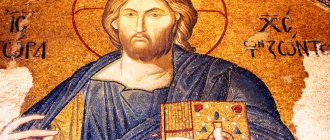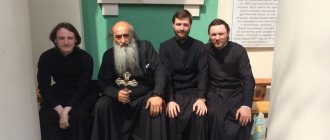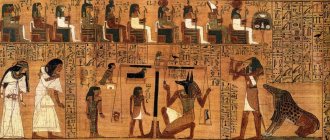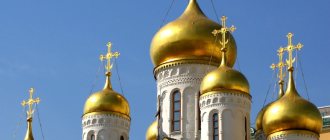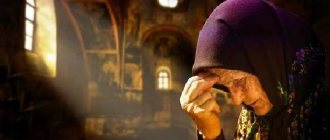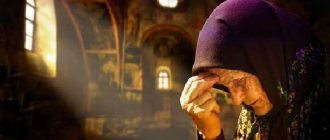What does it mean to be an Orthodox Christian?
We continue the conversation on the topic: “Be Orthodox!”, begun by the ruling bishop of the Maikop and Adyghe diocese, Bishop Tikhon. Today we give the floor to Mother Olga Evenko.
What does it mean to be an Orthodox Christian?
Today, probably, every person baptized in the Orthodox Church considers himself a Christian, but not everyone thinks about the question: what does it mean to be an Orthodox Christian? Saint Theophan, the recluse Vyshinsky, gave the following answer to this question: “It means to believe rightly, and to live holy, and to be sanctified by the sacraments, and to obey the leadership of pastors, and to belong to the Orthodox Church of God, and to strictly fulfill everything commanded by it...” [St. Theophan the Recluse , Letters to various persons on various subjects of faith and life].
For example, a person was baptized and considers himself an Orthodox Christian, but he does not even have an approximate understanding of Christ, of the stewardship of our salvation, of the duties of a Christian to the Church. If after Baptism a person does not live like a Christian, he loses the grace-filled fellowship that he acquired in Baptism. Hieromartyr Cyprian of Carthage wrote: “Whoever and whatever he may be, he is not a Christian, just as he is not in the Church of Christ.”
And if a person tries to keep the commandments, and goes to church regularly, prays, fasts, lights candles, and follows other spiritual rules, can he be considered an Orthodox Christian?
It is not enough to follow the rules, you need to live according to God’s commandments, increase your love for God and your neighbors, do works of mercy, and try to improve. Faith must change a person, transform the soul. Being a Christian is not about following rules, it is about a way of life.
God wants to see us as his children. You can read about this in the First Epistle of the Apostle John the Theologian: “See what love the Father has given us, that we should be called and be children of God. The world does not know us because it has not known Him.” (1 John 3:1). That is, we people must love Him as our Heavenly Father, we must understand this fatherhood. It is not written that God wants us to be his slaves. Slaves carry out the orders of the boss for the sake of wages or out of fear of punishment, and children do everything that the father wants out of love for him. How to learn to love God? The Lord Himself taught us this, saying: “If you love Me, keep My commandments.” (John 14:15)
Jesus Christ gave the commandment to people: “Thou shalt love the Lord thy God with all thy heart, and with all thy soul, and with all thy mind, and with all thy strength” (Mark 12:30). From this commandment it is clear that God wants us to love Him. And when you love, you do everything so as not to upset or offend the One you love with your behavior, you try to please Him, thank Him for every little thing, you don’t get upset if He doesn’t allow you something or doesn’t give you what you ask. Loving God means devoting time to Him every day to pray, to open our hearts to God, to thank Him and glorify Him, to meditate on His saving word. And if you truly love God, then you will love your neighbor, because he is also God’s creation, and there is a piece of Him in him. Love for Christ and neighbor should be the basis of a Christian’s life, his activities in church, behavior at home or at work, daily communication with family, friends, and strangers. It must guide the thoughts, feelings, conversations, and email correspondence of a Christian and must certainly be the basis of his liturgical life.
This is exactly what it means to be an Orthodox Christian. Not to be named, not to appear, but to be.
Olga Evenko
Conversation on the topic “Be Orthodox!” will be continued. We are waiting for new materials, reflections and reasoning from priests, theologians and laity on this difficult topic.
- Orthodoxy and us
- What does it mean to be Orthodox?
- Orthodoxy and the liberal idea
- Why go to Church?
Adults are an example for children
A child is born without sins. After all, a newborn cannot offend, offend or hate anyone. From the age of three, when the baby begins to pay attention to the world around him and get acquainted with it, his worldview is formed according to what is here and now.
After 3-5 years, the child begins to learn both good and bad. Often children start fighting in the sandbox and calling them bad names. Where does this come from? Even if one child has a friendly family, but the other’s mother and father constantly argue, then the latter can now copy the behavior of his parents and pass on the negativity to his friends in the sandbox. This is how the chain develops.
Starting from the age of 7, a child should be able to distinguish good deeds from bad ones. What does it mean to be an Orthodox person? The answers to this question lie precisely in the actions of any person.
Good heart and good deeds
An Orthodox Christian often comes to the priest at church to repent of his sins. Which ones? In all. Sins mean not only bad deeds (hit, killed, stole), but also a state of mind (hatred, anger, irritation, envy). Parents themselves should be kind, affectionate and caring people. Is it Christian when a mother screams at her child, hits her, and the child roars throughout the entire neighborhood for an hour? Of course not. If a child is naughty, then parents should act wisely, punish carefully and without scandals. Children often inherit the character and habits of their parents.
A child from the age of seven is allowed to confess. What does it mean to be an Orthodox person in this case? To love the Lord God and all people, animals, birds. After all, love manifests itself not only in care, but also in compassion, help, and consolation.
The Apostle Paul once explained what Christian love is and how it is expressed. Namely: love cannot envy, demand, adjust to oneself, hate, exalt itself over someone, rejoice at the sorrows of a neighbor or be upset when he is happy. The holy apostle said many more words on this topic.
Obedience
It is important for a Christian to be in obedience to someone. It is impossible to go with the flow without guidance from above. A small child must obey his parents and educators. If this does not happen, he will be in danger. The soul of an Orthodox person is also in danger if he undertakes to independently guide himself in life. To prevent this from happening, you need to have a spiritual mentor in the person of a parish priest or an elder, for example.
It is important for children to obey not only their relatives, but also the priest in church. What does it mean to be an Orthodox person during obedience? For example, a priest in confession will tell a child to stop hurting his classmate, because it is bad, God does not like his action. This is obedience from the confessor. Parents can say the same. And that will be obedience. But why it is impossible to offend a classmate from a spiritual point of view, the priest can explain.
Once again, we can remind you of the importance of expressing your thoughts and ideas. What does it mean to be an Orthodox person? Let the children write an essay-reasoning on a similar topic specifically about the kindness of the heart and love for God.
The Importance of Visiting the Temple
Adults do not always think about why they visit a temple. Is it just because it is necessary? This is wrong thinking. There is a funny caricature on the Internet: a temple is drawn on the left and right, on the right is the inscription “to the temple” - and hundreds of people are standing, on the left it is written “to God” - and only about five people are standing. What does this mean? Hundreds of people go to church just to light candles, write notes, and chat. And that small part of people comes to the temple to pray to God.
Children need to be taught to communicate with the Lord and pray. Preliminary preparation will help with this. For example, a children's Bible and the lives of saints. They talk beautifully about what it means to be an Orthodox person. Everything must become interesting for children, otherwise there will be no point.
How to write an essay
Not every school teachers touch on the topic of Orthodoxy. It is especially difficult for a child who grew up in an atheistic family or who was raised by people of other faiths, including Old Believers, to perceive this. How, then, can you carefully explain to children what it means to be an Orthodox person? The answer for 4th grade, where children still understand little not only in spiritual life, but also in everyday life, can only be given by actions. How? Teach them to treat each other with respect. In almost any class, pranks, quarrels, and insults happen. It is important to teach children to respect each other. Who in class constantly offends someone? Let the offender understand that you cannot do this. He needs to explain what mental pain is. The offended person should be advised not to give in, to immediately forgive, forget and make peace. After all, evil has the ability to flare up and burn very painfully.
A short essay “What does it mean to be an Orthodox person?” will help children develop a sense of meaning. What does it mean? Not every adult understands why he lives. It's time to think about what life should be like in order to live it usefully. It happens that an elderly person, before his death, admits that he does not want to die and is afraid, because he has done little good, has not repented before God, and in general has never thought about Him. The soul of the dying person feels that it is to the Lord that it will go to judgment.
Let children learn from an early age to love God and their family, friends and even enemies. After all, Jesus Christ loved and loves absolutely everyone, even those who killed him.
After the collapse of the Soviet Union, the historical destinies of two once united states, Russia and Ukraine, diverge further and further. Despite the fact that millions of Russians still live in today’s Ukraine, every year fewer and fewer of them identify themselves and their future with Russia. We have different currencies and passports, customs and borders lie between us, the space for using the Russian language is sharply narrowing. We still have a common past. But history in both our countries has undergone significant changes over the past decade. Now, apart from historical roots and the controversial Black Sea Fleet, only the Orthodox Church remains common to us. By law, the Church is separated from the state, but, as practice shows, in today’s society the Church cannot exist outside the state, outside politics. At least in Ukraine this is exactly the case.
"MOTHER OF RUSSIAN CITIES"
In Kyiv, it seems, every house and even every stone keeps traces of history. There is, for example, a stone with the following inscription: “From here the Russian land came.” It is not so much tourists who come to Kyiv from Russia, but pilgrims - to touch the ancient shrines. One of the first Christian churches in Rus' has been preserved here - St. Sophia Cathedral with mosaics and frescoes. Here is the land of the Apostle Andrew the First-Called and the first Russian monks.
Today, the historical churches of Kyiv have been restored and are open to visitors, but they make a mixed impression. The golden domes of churches are crowned not with eight-pointed crosses, as is customary in Orthodoxy, but with four-pointed crosses. The same powerful four-pointed crosses were installed on the alleys of parks in memory of the victims of the Holodomor - the “genocide of the Ukrainian people” and Stalin’s repressions. Perhaps the crosses express the modern desire of the Ukrainian authorities to make the country at all costs different from Russia (“Ukraine is not Russia,” as President Leonid Kuchma wrote in his book)? But it’s not just the crosses: some sounds come from the bell towers of the churches, more reminiscent of the clanking of cymbals than the usual booming bell. And finally, if you enter any ancient temple in the center of Kyiv, you will see that all the inscriptions in the church, including the names of icons and Orthodox holidays, are made in Ukrainian. An observant eye can notice very strange things. At the entrance to the St. Michael’s Golden-Domed Monastery there is a “poster”: the Liturgy of St. John Chrysostom, the music of “such and such”, performed by “such and such” choir. In the famous St. Andrew's Church, built in the 18th century according to the original design of Bartolomeo Rastrelli, ... Newsweek magazine and other Western secular publications are sold on a tray. The facade of the rotunda church on the legendary Askold's grave, saved from destruction by Nicholas I, is decorated with bas-reliefs of the Pope and statues of the Weeping Madonna. Such Christian eclecticism as in Kyiv cannot be seen, perhaps, in any city in Europe.
“Three churches are too many for Kyiv,” wrote the famous Kiev resident Mikhail Bulgakov in his essay about his hometown. - Old, living and autocephalous... The situation is this: the old hates the living and autocephalous, the living - the old and autocephalous, the autocephalous - the old and living. I can say with complete confidence how the useful activity of all three churches, the hearts of whose ministers are fed by malice, will end: a massive falling away of believers from all three churches and their plunge into the abyss of the most naked atheism.” This was written almost a hundred years ago, but this same remark of the great master can easily be applied to Kyiv-grad today.
YOU NEED TO KNOW THE PATRIARCH IN FACE
In fact, there are not three Churches in Kyiv, but much more. There are about six Orthodox associations alone that have emerged over the past ten years: apostolic, autocephalous, and renovationist. But these are all minor cracks, the consequences of a larger schism that occurred in the Ukrainian Orthodox Church (UOC) in 1992.
If you look at the world philosophically, then in any artificial combination of two things centrifugal and centripetal forces arise. The same can be noticed in society: as long as the union of Russia and Ukraine existed, nationalist organizations striving for independence from Moscow operated in Ukraine for just as long. Of course, first of all it was about political independence. But as soon as it was achieved, the spiritual connection with the Moscow Patriarchate seemed an unjustifiably heavy yoke: an “independent” power must also have an “independent” Church. This is how the UOC of the Kyiv Patriarchate arose, the head of which was declared by the former Metropolitan of Kiev, monk Filaret (Denisenko). The Council of Bishops, which met in Moscow, immediately appointed a new Metropolitan of Kyiv, Vladimir, defrocked Philaret and anathematized him, and declared the UOC-KP a schismatic group. But this did not bring much clarity to the consciousness of Ukrainian believers. In addition, the new “independent” government in Ukraine, especially after the “Orange Revolution,” is trying in every possible way to support the “self-proclaimed” Kiev Patriarchate as a nationally oriented Church. As a result of such church policy in Ukraine, the UOC-KP, which is not recognized by any of the Orthodox Churches in the world, is considered in Kyiv to be the exponent of the Ukrainian national idea.
Many ancient cathedrals and restored monasteries were transferred to the Kyiv Patriarchate. The famous Vladimir Cathedral, which preserved the paintings of the great Russian artists Viktor Vasnetsov and Mikhail Nesterov, became the cathedral church of the UOC-KP. St. Michael's Golden-Domed Monastery, restored in 2000, was also given by the country's leadership to the Kyiv Patriarchate. The walls of ancient temples, with their appearance and interior decoration, attract not only tourists and pilgrims, but also ordinary Kiev residents who are not too experienced in church disputes. And it’s not so easy to explain to a person who has come to God why he came to the wrong temple. Services in the parishes of the UOC-KP are conducted according to the same service books as in canonical parishes.
True, the text of the service has been translated into the state language, but since Ukrainian is in some ways closer to Church Slavonic than Russian, this does not hurt the ears.
Just think, instead of “paki-paki” they sing “shche and shche”, instead of the Patriarch of Moscow they commemorate “patriarch” Filaret - is that really the point! Both of them pray to the same God - so what difference does it make where to go! Any parishioner can object to me this way.
In Ukraine there is no obvious destruction and desecration of Orthodox churches, which can be seen in Serbia.
It is difficult to recognize the liturgy performed in the Ukrainian language as some kind of sacrilege. But it is precisely this subtle lie, seeping into the minds of believers, that fills souls with doubts, sows confusion and discord.
It is curious that in Moscow churches you will hardly see photographs of Patriarch Alexy II anywhere. Maybe on a calendar in a church shop. In Kiev, a photograph of the primate of the Church, to whose jurisdiction a given parish belongs, can serve as a kind of identification mark for a Christian, since most churches in Kyiv were built in the best traditions of Russian architecture. But to which Church they were given is a big question. If there is a photo of a pastor hanging in a church, then it’s for Protestants; if it’s the Pope, then it’s for Greek Catholics. And if there is a photograph of Metropolitan Vladimir in the church, it means that you have come to the church of the Moscow Patriarchate, you can settle down and feel at home.
IT'S HARD TO BE RUSSIAN
With the exception of the official “stronghold” of the UOC MP – the Kiev Pechersk Lavra – hundreds of parishes of the Moscow Patriarchate in Kyiv are located in residential areas of the city. Quite a few Orthodox communities literally huddle in small wooden buildings, or even in rented apartments.
The rector of the church named after St. Agapit of Pechersk, Archpriest Andrei Tkachev, is a well-known priest in Kyiv. For several years he has been hosting a children's Orthodox program “To Sleep” on one of the local TV channels. Father Andrey is a regular contributor to one of the best Orthodox online magazines for teenagers, Otrok.ua. “Is it easy to be Russian in Ukraine?” – we turned to the priest with this question.
“In Russia, for a Russian person to be Russian means to be Orthodox. A non-Orthodox Russian is as incomprehensible to me as an American who eats with chopsticks. But for Russians living in Ukraine, the issue of national self-identification is very difficult. I consider myself Russian in culture, in mind, in attitude. This feeling is more accurate than determining nationality by blood. Then our Tsar Nicholas II can hardly be considered Russian. Today in Ukraine it is difficult to be Russian. Unfortunately, people associate Russia with a lot of negative things. And those who consciously profess their belonging to Russian culture have a hard time.
There is a stereotyped Russianness in the sense of red caviar, constant drunkenness, foul language and massacres.
But there is something else in Russia: fearless officers, great scientists, talented representatives of art, holy ascetics. In this sense, we need to be worthy of this Russianness.”
Orthodox parishes in Kyiv, although they belong to the Moscow Patriarchate, do not receive any help from Russia and manage on their own. They bring literature from Moscow, organize trips, provide assistance to orphanages and shelters; humanly, Christianly. There are Orthodox brotherhoods in Kyiv that are trying to influence policies in the field of education and moral education. This year, an experiment is taking place in Kyiv to teach “Fundamentals of Christian Ethics” in schools.
We can say that in Ukraine the Church is trying to solve the same problems as in Russia. Only all this is against the backdrop of a schism, a constant “redistribution” of property between the old and newly emerging Churches. If you imagine all this, it becomes clear that Ukraine is also Russia, also our land. And maybe the Orthodox there are in some ways even more Russian than we are.
